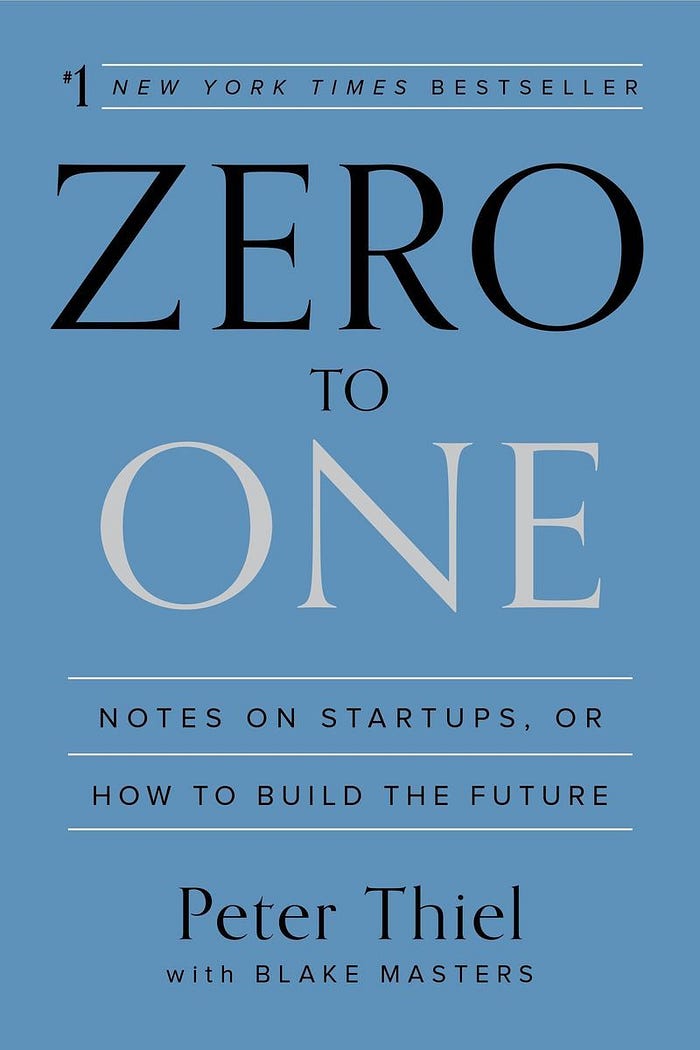Innovative Insights from Peter Thiel's "Zero to One"
Written on
Chapter 1: Understanding Breakthrough Innovations
In "Zero to One," Peter Thiel and Blake Masters delve into the distinction between revolutionary innovations that propel us from 'zero to one' and incremental improvements that merely advance us from 'n to n'. A significant theme throughout the book is the role of monopolies—why they can be beneficial and how they can be cultivated.
Monopolies often arise from genuine innovation, and this is a positive development. While society often touts competition as a virtue, the reality of competitive markets can lead to harsh outcomes. For example, in the culinary industry, intense competition can pressure prices downward, adversely affecting employee wages. In contrast, monopolies have the latitude to prioritize their workforce and social accountability.
To establish a monopoly, one must innovate to such a degree that replication becomes nearly impossible. The allure of sustained profits over many years serves as a compelling motivator for innovation, which is why governments issue patents— to encourage this creative drive. However, competition can divert focus from groundbreaking ideas, compelling us to merely replicate existing successes.
Section 1.1: The Merits of Monopolies
Monopolies not only foster innovation but also contribute to societal advancement. The prospect of long-term profits motivates companies to push the envelope and develop new technologies.
Subsection 1.1.1: The Dark Side of Competition

Section 1.2: The Necessity of Technological Progress
The book warns that without technological advancement, globalization cannot sustain itself, which could lead to severe consequences. As globalization intensifies, so does industrialization, leading to greater environmental challenges and competition for finite resources.
Although American consumers may benefit from lower prices on goods manufactured in China, this comes at the cost of rising gas prices linked to mass production practices. Absent technological breakthroughs, globalization and industrialization could precipitate ecological disasters and fierce competition for dwindling natural resources.
Chapter 2: Incremental vs. Revolutionary Progress
In this animated summary, key concepts from "Zero to One" are illustrated, emphasizing the importance of innovative thinking.
The next leap from 'zero to one' is a unique occurrence. For instance, it's unlikely that the next Bill Gates will recreate an operating system, nor will the next Mark Zuckerberg build a new social platform.
Creating value is distinct from capturing it; for example, while airlines generate substantial value, their profit margins are minimal.
It's advisable to begin in a niche market before expanding to broader markets. Amazon exemplifies this strategy by starting with books and later diversifying into multiple sectors.
Focusing on a market that is too large may indicate it’s not the right fit, as such markets can be crowded or lack a clear entry point.
For a product to achieve network effects, it must deliver immediate value and function effectively on a smaller scale first, as seen with Facebook's initial focus on Harvard students.
Many startups chase short-term metrics, overlooking the significance of long-term sustainability and future cash flow, which are ultimately more critical than immediate revenue targets.
The lean startup model often falls into the trap of constant iteration without a definitive direction, which may prevent true innovation.
The power law suggests that within any market, a singular strategy or moment can yield exceptional success. In venture capitalism, a few standout companies can outperform the entire portfolio, underscoring the importance of investing in those with high potential.
High CEO salaries might disincentivize necessary risks, as executives may prioritize their compensation over innovation. By compensating with equity, they align their interests with the company's growth.
When hiring, it’s crucial to communicate the mission clearly to attract talent who are passionate about the cause rather than merely the benefits.
A cohesive team identity can be fostered through shared branding, while effective sales strategies are as critical as product quality. Many startups fail due to inadequate distribution channels rather than inferior products.
A business's worth is determined by the anticipated profits over its lifetime, while the notion of social entrepreneurship often lacks innovation.
Summary: Checklist for Success
- Technology: Is your technology a substantial leap forward or just an incremental change?
- Timing: Is this the optimal moment to introduce your technology?
- Monopoly: Are you targeting a significant portion of a niche market?
- People: Do you have the right team in place?
- Distribution: Is there a clear strategy to market your product?
- Durability: Will your company thrive in its market over the next 10 to 20 years?
- Secret: Have you identified a unique opportunity that others have overlooked?
This second animated summary further explores the key themes from "Zero to One," reinforcing the importance of innovative thinking in today's competitive landscape.